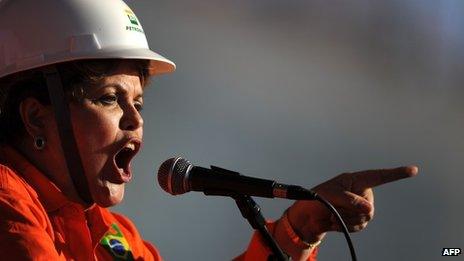Brazil troops to guard controversial Libra oil auction
- Published
Protesters took to the streets of Rio de Janeiro and other cities
Brazilian union leaders have criticised a decision to deploy the army to ensure security at a controversial oil exploration rights auction on Monday.
President Dilma Rousseff has ordered that more than 1,000 troops be deployed outside the seafront hotel in Rio de Janeiro where the auction will be held.
Oil workers began a strike on Thursday to protest against the sale.
The strike has disrupted production on more than 40 oil platforms. Some main refineries have also been affected.
"It is absurd that the Brazilian government deploys army troops to guarantee that the Libra oil field is handed over to foreigners," said Jose Antonio de Moraes, president of the Unified Federation of Oil Workers (FUP).
'Monopolistic aspirations'
The unions say 80% of services at state oil company Petrobras have been affected by the strike, which is due to go on at least until Monday.
The 40,000 Petrobras employees are also demanding a pay rise and changes to plans to have some services contracted out to private companies.
"Our aim is not to hurt the population, but we will carry on with the strike for an indefinite period, until our demands are met," said Mr Moraes.
The BBC's Wyre Davies: "The figures are almost mindboggling and the opportunities almost endless"
Seven bidders are expected at Monday's auction.
Petrobras will be bidding against Anglo-Dutch Shell; Colombia's Ecopetrol; France's Total; a consortium made up of Spain's Repsol and China's Sinopec; China National Petroleum Corporation (CNPC); and the China National Offshore Oil Corporation (CNOOC).
The unions say the Libra oilfield auction will damage national interests by allowing foreign companies to share production rights with Petrobras.
They have taken legal action to try to halt the sale.
National Petroleum Agency president Magda Chambriard said the government was prepared to deal with such action.
"There is a small group of people in Brazil who still have monopolistic aspirations. Our job is to safeguard the security at the venue and the legal aspects concerning the auction to make sure it is successful," she said.
Thousands of demonstrators are expected to march towards the Windsor hotel in the Barra da Tijuca area of Rio.
But the army says it will block roads leading to the area early to prevent protesters getting there and to guarantee the security of those taking part in the auction.
Thursday saw demonstrations outside the Petrobras headquarters in Rio and government buildings in the capital, Brasilia.

President Dilma Rousseff has called off a state visit to the US this month over allegations of American espionage against Petrobras
The Libra field is a deepwater oilfield in the Santos basin, some 230km (140 miles) off the coast of Rio de Janeiro.
It belongs to the Brazilian government's National Petroleum Agency (ANP) and is part of huge oil reserves discovered in 2010 under a layer of rock, sand and salt beneath the seabed.
The discovery potentially doubles Brazil's known oil reserves.
Ms Chambriard said that she expected production to peak in Libra at 1.4 million barrels a day in a decade.
The Libra field has estimated recoverable oil reserves of eight to 12 billion barrels, according to the National Petroleum Agency.
- Published18 October 2013
- Published3 August 2012
- Published30 October 2010